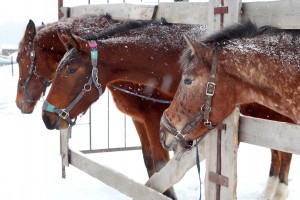Guest Post by Ashly Snell
 Taking care of your horse during cold weather often demands a different set of requirements than warmer weather. When the wind starts to howl and the temperatures begin to drop, keep these tips in mind so your horse can be well cared for:
Taking care of your horse during cold weather often demands a different set of requirements than warmer weather. When the wind starts to howl and the temperatures begin to drop, keep these tips in mind so your horse can be well cared for:
Shelter: First, horses can benefit from having shelter access. Ideally, the shelter should provide a safe haven from snow, wind, sleet, rain, hail and other inclement weather. Stalls and run-in sheds should be bedded with straw, shavings or packed dirt. During winter, the straw can serve as an extra layer of warmth for horses stabled outside. Shelters should be cleaned on a regular basis to remove old manure and urine piles. If straw or shavings are used, fresh bedding should also be added regularly.
Stable Care: If your horse is indoors for part of the day, make sure he is wearing the proper stable blankets. While a well-insulated barn might remain a few degrees warmer than the outside temperature, a barn can still become chilly when temperatures drop below freezing. Using stable sheets and heavier stable blankets can help your horse stay comfortable.
Warm Water: Whether your horse lives outdoors year long or comes into the stable at night, he needs to have access to fresh water. During winter, it is important that at least one of your horse’s buckets is filled with warm water. All too often, a horse won’t drink enough during the cold months — which can possibly lead to dehydration and other illnesses. Keeping one heated bucket of warm water at hand ensures your horse has access to fresh, clean and ice-free water, daily.
Feed: Like people, horses tend to burn extra calories when they are trying to maintain body temperature during cold weather. Extra hay and feed can be given to contradict calorie-burning effects of cold weather. Be sure to consult with your barn manager and veterinarian before altering your horse’s feed.
Blanketing: Knowing what blankets to put on your horse depends on the thickness or length of your horse’s coat, as well as outdoor temperatures and weather conditions. No matter which type of blanket your horse is wearing, check for chaffing and irritation, daily. Staying ahead of blanket rubs will go a long ways toward helping to keep your horse’s coat beautiful all season.
Exercise: During the cold months, it is especially important that you take precautions when exercising your horse. Prematurely blanketing a horse that is too hot from exercise can lead to colic, tying-up and other bodily injuries. As a protective measure, make sure your horse is thoroughly dry and properly cooled (i.e. not breathing heavily) before re-blanketing your horse. When you are riding your horse, you can use a cooler or quarter sheet to keep his muscles from becoming strained due to cold weather. Quarter sheets are particularly useful when riding a clipped horse during winter.
Hand Walking: If the cold weather is keeping your horse cooped up for long hours, take him out for at least a 20-minute hand walk (provided, of course, that you have an indoor or covered area to walk in). Hand walking can help relieve boredom, stretch stiff muscles and remove stress.
Hooves: Be on the lookout for thrush — a bacterial infection that can take place in a horse’s hoof. To help prevent thrush, clean your horse’s hooves daily and be mindful of wet pastures. You can also consult with a farrier to see how often his hooves need to be trimmed or shod. Finally, keep snow from gathering in your horse’s hooves, which can cause thrush and make it hard for your horse to walk comfortably.
Skin Care: A horse’s skin can often become dry during winter. As such, curry your horse’s coat on a daily basis, use a dandy brush to remove dandruff, and a soft body brush to bring out a beautiful shine.
In addition to following the above tips, keep a list of emergency contacts, extra water, feed and grain — as well as flashlights and spare blankets handy in the barn. If Old Man Winter is in a particularly cantankerous mood, both you and your horse will be happy that you are well prepared for the cold winter months.
Author Bio
Ashly Snell works in digital marketing for Dover Saddlery- known for their catalog, websites and several Dover Saddlery Retail Stores. She has written on a wide array of horse topics for publications such as Ride Magazine, and Horse Family Magazine.
If you enjoyed this post or found it helpful, let me know by leaving a comment below. You can also find me on Facebook where I always appreciate a LIKE. To order any of the products mentioned in this post or other products for you or your horses, please visit my online store.